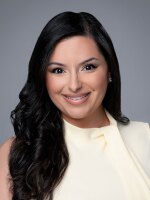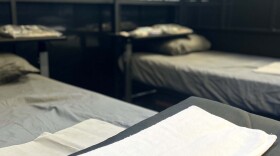As the more contagious Delta variant continues to circulate and cause more infections, even in kids, many parents are anxious about how to best protect their children. Especially since there’s no vaccine available for those under 12. The rules about what is and isn’t safe vary from one activity to another. So, we decided to ask experts in infectious disease and public health how they are keeping their own children safe.
Here’s what they had to say:
“I’m Rebecca Fielding-Miller, and I’m an assistant professor at UC San Diego’s Herbert Wertheim School of Public Health and Human Longevity Science...I have one daughter, she is 3, she will be 4 next month. We were actually lucky enough to be in what’s called the open label part of the trial. So we know she got the actual vaccine, because she’s in the part where they’re trying out different doses to see how kids react. So we know she got the real vaccine and we know how much, which is really exciting.”
“I’m Christian Ramers. I am an infectious disease specialist and chief of population health at Family Health Centers in San Diego. I have a 16-year-old boy and a 13-year-old girl...both my kids are fully vaccinated.”
“I’m Corinne McDaniels-Davidson. I’m the director of the San Diego State University Institute for Public Health, I’m an epidemiologist, and I have three children. An almost eight year old, a four year old, and a one and a half year old... My children are not able to be vaccinated yet. They are signed up for clinical trials, but we haven’t gotten the call yet... I wish my children were over the age of 12 so that they could be vaccinated right now. I think that especially going back to school and having a lot of children congregated all together it would be ideal for all children 12 and up to be vaccinated. A lot of people think that kids aren’t affected by COVID and they absolutely are. We know that 2% of kids who will get COVID will require hospitalization, that seems very small until you consider that here in California we have nine million children and once you take 2% of that, that’s quite high. We also know that 1 in every 3,200 about will get MIS-C and that’s also something that we don’t want to mess around with and we just don’t know the long-term impacts of COVID, we see a lot of post viral illness and I'm not comfortable with my kids being exposed to that and we know the vaccines are safe in kids 12 and older.” -- Corinne McDaniels-Davidson
RELATED: COVID-19 Cases Surpass 300,000 As County Marks 2 Million Fully Vaccinated
Q: Do you feel safe sending your children back to school or daycare?
A: “When everything closed down, we had to find a new childcare site, like a lot of people last March. One of my highest priorities was finding a place with really good ventilation. So we actually chose a daycare that at the time was entirely outdoors -- the kids are always outside, and it’s very small. There’s about 10 families, and the parents all have really good communication. Now, the parents are all vaccinated, and we all cheered one another on as we all got our vaccines. Those protocols were really important to me, when I did send her back to childcare, which obviously I really needed to be able to do my job.” -- Rebecca Fielding-Miller
A: “My son actually goes to a Catholic high school and has been in person for most of the year. So they did, I think, a really good job of essentially taking to heart all of the mitigation measures -- distancing, the ventilation, they even did some cohorting and then did as much outside as they possibly could. And we did see cases with those measures, but not outbreaks, I would say... And so we felt generally pretty safe and then spent a lot of time with him in terms of how he can protect himself, mainly with a mask. My daughter has actually been in a public charter school, a middle school, and they've been mostly online and are just moving into a sort of hybrid-type situation. And yes, we are going to be sending her and again, a lot of this is behavior, she is very, very attuned, having seen all of the interviews that I've done. And we talk a lot at home about how to keep yourself safe. And she's very interested in going back to school in person and will be wearing a mask as well.” -- Dr. Christian Ramers
A: “It was a tough decision figuring out whether we should send our kids back to school and daycare. Ultimately, we needed childcare for the younger two in order to continue working. Luckily, our place of childcare is at the SDSU children's center, and the precautions that they have taken went far and above what was recommended. And I felt really comfortable with the decision to send them there, with the ventilation, the outside time, the masking, the contact tracing. So the younger two have been in daycare since last fall. My oldest, the soon to be eight year old, we did not send her back to school last spring. We decided to keep her remote and finish the year that way. She will go back in the fall. She will be at a small school with small class sizes and strong masking and ventilation.” -- Corinne McDaniels-Davidson
RELATED: Family End of Summer Palooza Provides Free COVID-19 Vaccines
Q: How comfortable are you with your children participating in group activities and playing outside?
A: “I choose things that are very low risk as much as I can manage things that are outdoors, but really we aren’t doing any other group activities besides childcare and an outside music class where everybody is six feet away from everybody else, and I’m personally not comfortable with anything besides that at the moment.” -- Rebecca Fielding-Miller
A: In terms of group activities, that's a little trickier. I'll give you an example. This weekend we had a couple of families get together and we really had to reach out to all the parents and communicate about vaccination status. All the families and kids that were eligible were vaccinated, but there were some below age 12. And we had to do testing to know that it was really safe to be together. And then those kids that were less than age 12 actually wore masks indoors. So it takes a lot of management, a lot of discussion about how to mitigate your risk and how to decrease your risk. And we try to spend as much time outdoors as possible.” -- Dr. Christian Ramers
A: “We feel comfortable playing at the playground, if there are very few other children, and we try to go at the non-peak times. We do ask our children to mask if there are other children present... Other outdoor activities we’re pretty careful about. We’ll go outside and play catch with the neighbors and things like that but nothing that’s in too close of proximity.” -- Corinne McDaniels-Davidson
RELATED: ‘Back To Work SD’ To Provide $10 Million In COVID Relief For Businesses
Q: Is there any difference in how you approach this pandemic as parents vs professionals?
A: “I’m in public health and public health is really about 'how do we keep everybody safe, treat everybody well and make sure that everybody has the opportunity to be as healthy as possible,' and I want every child to have the same opportunity to be healthy and safe and protected just like I want that for my daughter. There’s no advice that I would give for somebody else that isn’t what I would do for my kid.” -- Rebecca Fielding-Miller
A: “I've had friends and family that have died from COVID, so I take it seriously as a provider and I take it even more seriously as a way to protect my family.” -- Dr. Christian Ramers
A: "My training as an epidemiologist and my role and job as a mother are so intertwined right now. I typically give the same advice that I practice in my life, because I want others to be just as safe as we are. I know though, that I have some privilege, and that not everyone has the ability to do some of the things that we’ve been doing, so I try to keep that equity lens in mind, in terms of public health messaging. But I think I do talk about the pandemic in the same way as a mother and as a public health professional.” -- Corinne McDaniels-Davidson









